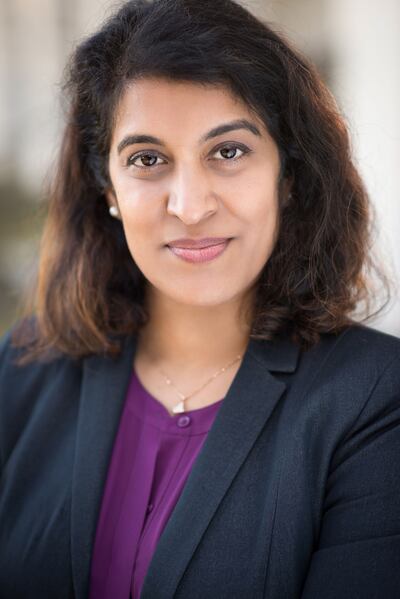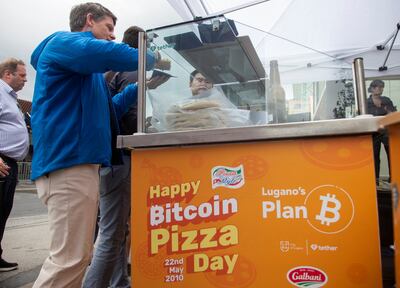In January 2018, when I sat down to interview blockchain expert Sheila Warren in Davos during the World Economic Forum's annual meeting, the Bitcoin bubble was about to burst. It was not the first cryptocurrency crash, and certainly not the last.
At the time, Ms Warren was head of the Blockchain and Distributed Ledger Technologies practice for the World Economic Forum. Today she is chief executive officer for the Crypto Council for Innovation, an industry body working to promote the benefits of developing technologies such as the blockchain, the metaverse, digital currencies, NFTs and other innovations that are reshaping the internet as we know it.
Members of the alliance include venture capital giant Andreessen Horowitz, asset manager Fidelity Digital Assets, payments provider Block, trading network Paradigm, crypto exchanges Gemini and Coinbase, and VC Ribbit Capital.

All are vying for their piece of the ever-growing Web3 pie.
The metaverse market was worth about $300 million in 2020. In 2021, blockchain was worth about $4.5 billion and the cryptocurrency market was estimated at about $1.5bn. Of course, the hypothesis is that all of these related sectors will balloon in size and value over the coming decade.
Ms Warren suggests the growth over the last four years is visible on Davos’ Promenade, where storefronts are temporarily transformed into glorified marketing stalls during the week of the annual meeting.
“In 2018, it was just crypto crazy like it is now but it was ‘crypto chalet’ and ‘crypto lodge’… now, it's Polygon, you see Filecoin … Circle … that’s really amazing,” Ms Warren says, as we talk in the Media Village area of the Congress Centre at the start of the Forum’s spring time 2022 annual meeting. “To think about how far we've come in a pretty short period of time, where just the value of the industry [has reached].”
While immense growth is happening in the broader Web3 market, on the exchanges, the price of cryptocurrencies, including Bitcoin, has nose dived — a reality that Ms Warren has managed to turn into a positive.
“I like the fact that we're gonna get a lot of the kind of like, hangers on, if you will, out of this ecosystem, who aren't serious about building because it's hard,” says Ms Warren. “It's hard to create economic models around this stuff. You have to be committed. And so I think we're gonna see a lot of this sort of nonsense [around crypto] go away, like we did in 2018.”
Education and advocacy will be more important than ever now, especially around the realities of Web3.
“People talk about the metaverse as if it's like one thing. That's not really how it's gonna work. You're gonna have different metaverses with gating in them and the gating may well be an NFT. You need this NFT credential, it gets you into a metaverse right now. I don't know what the language will be around this as we're still figuring it out, but it's not just going to be one online experience. Web3 is different.”
The council is focused on the blockchain specifically, and permission-less, open decentralised systems, she says.

“It's a time where the industry is arriving. We're at an inflection point, you know, and I think that you've seen in the regulatory landscape with [President Joe] Biden's executive order [on Ensuring Responsible Development of Digital Assets] or other things, you gotta take this stuff seriously," she says.
"Where as in 2018, I think we're kind of like, 'is it just going to fade into being a part of the tech stack ... and Bitcoin remains something [else] ... Now, crypto is an industry in its own right."
"It's going to be predicated on crypto economic models, for sure.”
Ms Warren says the council is also working toward inclusive growth, and what that will take.
“The reality is, if we don't provide a lot of evidence, education and advocacy, we're going to wind up with a very constrained environment, that's going to dictate what we can do.
“That's problematic. Because the reality is who's going to have access to [Web3] the same demographic that's had access in the past: very wealthy people who have nothing to lose who, can create closed doors," she said.
She says part of the problem with some internet models and tech models and platform models, is they favour certain geographies and languages, such as English.
As if on cue, on Wednesday, the World Economic Forum announced an initiative to develop an “economically viable, interoperable, safe and inclusive metaverse” together with companies including Facebook parent Meta, Microsoft and HTC.
“Done well, the metaverse could be a positive force for inclusion and equity, bridging some of the divides that exist in today’s physical and digital spaces,” said Nick Clegg, Meta’s president of global affairs.
“It mustn’t be shaped by tech companies on their own. It needs to be developed openly with a spirit of co-operation between the private sector, lawmakers, civil society, academia and the people who will use these technologies. This effort must be undertaken in the best interests of people and society, not technology companies.”
Meta’s message echoes what Ms Warren says about the importance of inclusion while at the same time confirming her biggest warning: narrow control by the wealthiest companies over what are intended to be universally accessible technologies.
"I've always seen myself as acting on behalf of, I don't want to call them consumers, but people [should] get precedence in this ecosystem," Ms Warren said. "What's been critically important for the beginning is making sure that people who are not like me, that don't have the privilege that I have in this ecosystem, are able to access these opportunities."
Ms Warren highlights the example of Axie Infinity, a blockchain-based play-to-earn game that spread like "absolute wildfire" in the Philippines and other nations.
"It's not a great example, because of what happened recently [with the crypto crash], but the model ... it proved [the idea]. Now you have a chance to stay in your country and earn a living," she says. "And so I think that there are so many parts of the world where it's forgotten that this flow of labour ... has gotten so complicated with the pandemic."
Ms Warren concedes the reputation of the crypto industry needs better "parameters around spotting scams".
"The reality is, we want to mitigate that as much as we possibly can, but it's never going to be zero. So we have to just be practical about it and say, 'How can we ensure that we're empowering people to make educated choices themselves?'"
It's a big question — and the answers are still to be decided.


